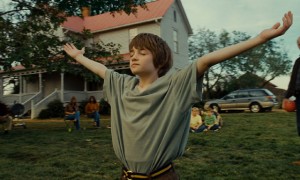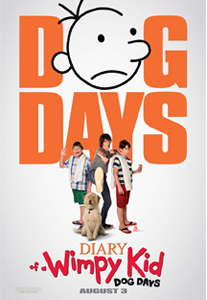The Odd Life of Timothy Green
Posted on August 14, 2012 at 6:00 pm
B| Lowest Recommended Age: | 4th - 6th Grades |
| MPAA Rating: | Rated PG for mild thematic elements and brief language |
| Profanity: | Brief mild language |
| Alcohol/ Drugs: | Some social drinking |
| Violence/ Scariness: | Some sad losses and references to loss of parents |
| Diversity Issues: | None |
| Date Released to Theaters: | August 20, 2012 |
| Date Released to DVD: | December 3, 2012 |
| Amazon.com ASIN: | B005LAIIKS |
 I have one copy to give away to the first person who sends me an email at moviemom@moviemom.com with “Timothy” in the subject line! Don’t forget your address!
I have one copy to give away to the first person who sends me an email at moviemom@moviemom.com with “Timothy” in the subject line! Don’t forget your address!
One of the biggest surprises — and greatest pleasures — of being a parent is learning how different your child is from the one you dreamed of, and finding out that the reality is so much better than you could have imagined. That is the theme of the endearing fable, “The Odd Life of Timothy Green.” Jim (Joel Edgerton) and Cindy (Jennifer Garner) meet with an official from an adoption agency to explain why they are fit parents, and it turns out to be the story of Timothy, who came to be their son after they had given up.
“You couldn’t have tried harder or done more,” they are told as the movie begins. All of their time, money, and energy has been focused on trying to become pregnant, but nothing has worked and they are devastated. They decide to mourn their loss by writing down a list of qualities and talents they would have wanted in a child. Honesty, of course. Musical and artistic talent would be good and he should have a good sense of humor. He does not have to be a star athlete, but it would be nice if just once he made the winning goal. They bury the list in the garden and prepare to move on.
But then, he is there, a 10 year old boy covered with dirt. He says his name is Timothy (CJ Adams). He calls them by the words they had hungered for: “Mom” and “Dad.” And he has leaves growing out of his legs, leaves that can’t be snipped off, even with gardening shears. They decide not to question it, just to enroll him in school and be a family. They agree that it puts him under too much pressure to say, “Have a great day!” before school, so Jim just says encouragingly, “Have the day that you have.”
Jim works in the town’s struggling pencil factory. Cindy works for the pencil company’s imperious owner (Dianne Weist) at the local museum devoted to the company’s founder. As they cope with problems at work and with their extended families (an ailing relative, a competitive sibling, a distant and judgmental father), Timothy inspires many people because he seems to understand and appreciate the world around him. He forms a friendship with an artistic older girl. And he manages to fit every item on the buried list, but in his own way.
As someone once said, “I used to have four theories about children. Now I have four children and no theories.” And as someone else once said, “Adults don’t make children. Children make adults.” The great gift of parenthood is the way it makes you jettison so many assumptions — about who you are and who your children are. When you meet your children, you begin to meet yourself as well. This whimsical, bittersweet tale is one of the summer’s nicest surprises.
Parents should know that this film deals with infertility issues, sad losses and references to death of parents, bullies, and includes some brief schoolyard language.
Family discussion: Where do you think Timothy came from? What would have been different if he turned out the way Jim and Cindy expected? How did they learn to be better parents?



